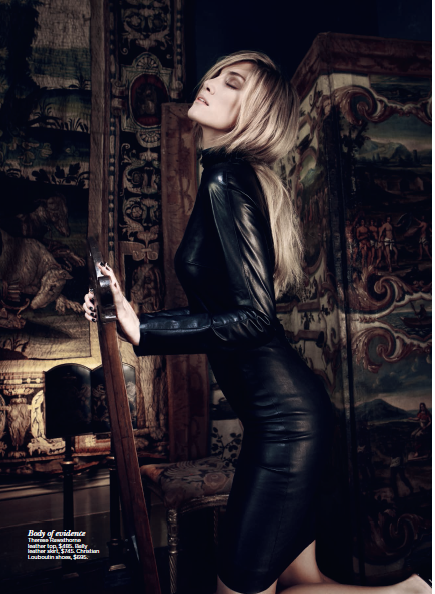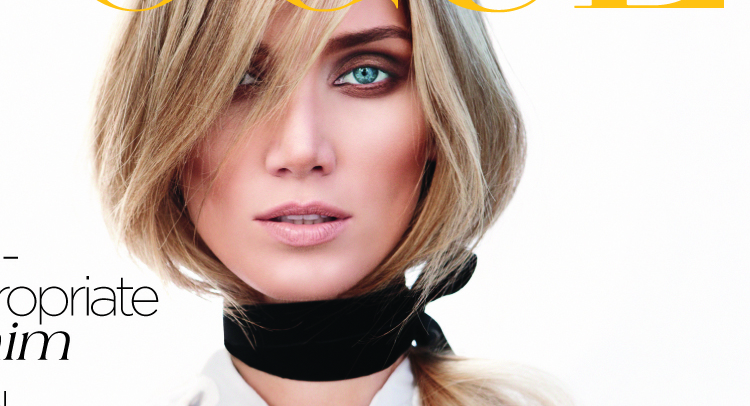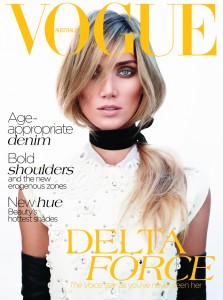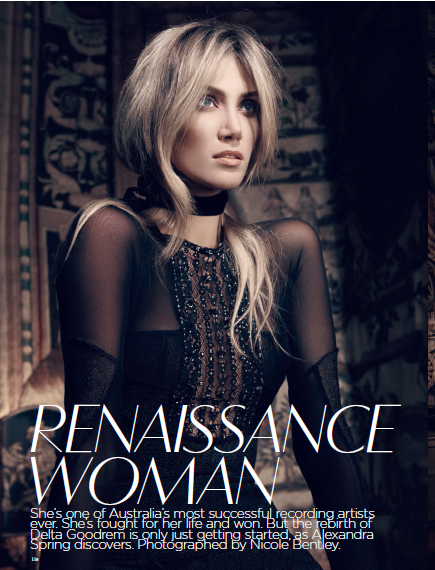I feel like it’s a totally different chapter; I feel like I’m back to being me again.”
Delta Goodrem and I are in an elegantly appointed Sydney hotel suite. A light autumn breeze blows in from Hyde Park, through windows flung wide open. Goodrem is wearing a sleeveless white tuxedo shirt with fitted black tuxedo pants, and has kicked off high black Louboutins to curl up on the soft grey couch. Her enviable blonde mane is gathered into a sizeable topknot, her lips are stained with red, and thick black false lashes frame that direct blue gaze.
She speaks quickly and intensely, often exclaiming, often laughing, her armful of gold bracelets jangling as she gestures. “I had some really big revelations in the last year, and then at the start of this year. It’s as if I snapped and just grew up.” She sighs. “And I know that I’ve been grown up since I was a kid, but I mean that in a very different way.” Another long pause. “I feel like I was in a prison for a second and I feel like I’m free again.”
The singer is playing a selection of songs from her highly anticipated fourth studio album, with the volume on the hotel stereo turned all the way up. Her fingers trace piano keys, a bare foot reaching almost imperceptibly for a pedal, as we listen to the first track, a heart-wrenching ballad she wrote for a close friend killed in a motorcycle accident. Next is one of her favourites, Dancing with a Broken Heart. She recites the words: “I won’t look back tonight because this is the time in my life, underneath these stars, I’m dancing with a broken heart. You’ve got to fight fire with fire, the truth to a liar, I’m going higher, dancing with a broken heart.” These songs are clearly very personal. She looks at me steadily when I point out that the lyrics are open to interpretation. “I think you can get to know an artist very well if you listen to their album.” She doesn’t mind? “No, it’s what connects us, because they have probably gone through the same thing.”
Ever since an 18-year-old Goodrem burst onto the music scene in 2003 with the heartfelt Born to Try, she has had the unerring ability to connect with her audience with her unflinching honesty. Songs like Out of the Blue, Mistaken Identity, Believe Again and I Can’t Break it to My Heart have chronicled her journey from ambitious tween to Australia’s sweetheart. And that honesty has made her a star. Born to Try reached number one, with the album Innocent Eyes remaining on top for a record 29 weeks and selling 4.5 million copies worldwide. Goodrem went on to achieve eight number ones with two more platinum albums, Mistaken Identity in 2004 and Delta in 2007.
“I was very ‘white line
fever’ … it’s a different
animal instinct. I’m very
calm but when it comes
time to play and perform,
it’s a different energy
The last few years have been quieter, with Goodrem focused on touring and also writing songs for other artists, including Olivia Newton-John, Celine Dion and Michael Bolton. But now, 10 years after her first number one, she’s back and experiencing a renaissance, thanks partly to her coaching role on the Nine Network’s surprise hit talent show The Voice, alongside Keith Urban, Joel Madden and Seal.
She relishes the experience, enthusing about her fellow coaches and about being surrounded constantly by music. Being a mentor to talented individuals is what appealed. “I’m not a judge, it’s not a role in the universe I want to have.” Yet it would be fair to say that viewers are seeing a different side to Our Delta. Gone is the shy, demure teen, behold a feistier and unashamedly ambitious Goodrem, who wants to win.
In fact, it is this that has driven her all along. Growing up in Sydney’s Hills District, Goodrem was captivated by music but she was also very sporty. A competitive spirit was encouraged by her family. “I was very ‘white line fever’ and when I got on a court, I had to win,” she says. “It’s just a different animal instinct. I’m very calm but when it comes time to play and perform, it’s like a different energy.”
Her parents instilled a belief in both her and her younger brother, now a professional AFL player, that anything was possible. “My whole life, I did believe that anything is possible,” she says, eyes wide. And what she loved most was performing. “When I was a kid, people would always start crying or they would feel something and I wanted to do that – and I felt really sad if they weren’t crying,” she says laughing, remembering her determined younger self thinking: “What’s wrong with me? I did a terrible performance.”

She was signed to Sony Records at just 15, releasing the disappointing single I Don’t Care, remarkable only in how lacking in authenticity it appears compared to her subsequent work. Yet the young Goodrem took the opportunity to learn everything she could about the music industry, asking questions from the industry heavyweights she met and collating the information diligently in scrapbooks. She puts this determination down to having a clear vision of her musical future, adamant that she wanted to be a good role model with a positive message.
Sure enough, the earnest Born to Try was a smash. She maintains this early success didn’t change her. “I think when you’re in it for the right reasons, you don’t.” She only wanted to create music. “You learn as you go and I think when you want to be the best in the world, like I do …” A-ha! The best in the world? “Yep, absolutely,” she says. “I know where I should be and I’m still only 27. I’ve had this wonderful, incredible journey with Australia and with different countries, but also due to my life, there have been lots of stops and starts, and so right now is the best time in my life to take flight again.”
Indeed, there have been plenty of stops and starts. In 2003, at only 18 years of age and just after the release of her debut album, Goodrem was diagnosed with Hodgkin’s lymphoma. It was a shock. “I’m a straighty one-eighty, I was always sporty, I had never had a drink, I’ve never had a cigarette, I don’t touch drugs, I’m completely clean.”
She went straight into treatment upon diagnosis, a terrifying experience. “I lost my identity, my skin was green, I had a comb-over at 18. Everything changes, your whole body changes. You look at the world differently, you get very dark colours and nothing can stay the same after that.” It was also a time when that steadfast ambition faltered. “I was like why, what is all this? You question everything.” It took her two years to recover fully, and she admits she struggled. She jokes: “You are trying to grow your hair and it’s just not right. I didn’t style it very well or I didn’t know how to dress with that hair.”
She missed out on the success of her debut album. “It was heartbreaking because I had just broken through and I didn’t get to tour and that was something I had been looking forward to my whole life.” Instead she watched it go to number one from a hospital bed. “In saying that, what would you rather? I’m so thankful to be here today and health comes first.”
Although she’s constantly vigilant, she has since been given a clean bill of health. “I’ve always had a low immune system but just healthy living [and] being happy is good for it.” The shadow of the experience still lingers. She gestures quickly to a barely visible scar on her neck. “It’s the scar, but I look at it like it’s a gift as well,” she says, inscrutably positive. “I don’t want to do it again, I’ve been there, done that … but I’m thankful for the depth it’s given me, the different perspectives.” She remains a patron of St Vincent’s Hospital’s Kinghorn Cancer Centre, where she underwent treatment. “When you go back to the hospital, you just instantly go to throw up – but I’ve learnt so much.”
And, of course, there was a time when she became more famous for her love life than for her music. First there was an ill-fated relationship with tennis player Mark Philippoussis. Then she had a seven-year relationship with Irish singer Brian McFadden, which ended when they called off their engagement in April 2011. Her energy dips when I asked what happened. Goodrem clearly wants to maintain some dignity around their break-up but there is much bubbling beneath the surface. “There is so much I’d like to say,” she admits. She takes a deep breath. “I was really unhappy and I didn’t know how to get out. I learnt. I got there in the end,” she says, laughing gingerly. “But I didn’t know how to leave and a couple of years go by and it was putting me in a space I didn’t want to be and didn’t want to be associated [with] – and I find it a little bit embarrassing even now.”
But she’s proud of herself for finally making the changes that she needed to. “I feel that I now have a different relationship with women, that I can understand certain colours, so I’m thankful for that. I’m disappointed that I took so long, I could have got out a little quicker.” Their relationship was further complicated by entwined representation, which Goodrem also broke off. “All I can feel is that everything’s back to where it should be. I’m so …” she pauses, “relaxed now. I’m not meaning to be negative. I mean that people can be very different to what you think and have very different worlds to even what you are aware of,” she says, “and I’m just really happy to be back where I should be.”
“I have so much love
to give … I am very
affectionate and so I’m
just happy to be single
and meeting different
people and just enjoying
being a 27-year-old”
Going through heartbreak in the public eye couldn’t have been easy; the mantle of Australia’s sweetheart must weigh heavily. “Absolutely, and I would never want to let them down, either. I feel like it got to a point where they were now looking at me going: ‘What’s going on, we don’t understand this any more!’” She laughs heartily. “I’m like: ‘I don’t understand, either!’”
Since the break-up she’s had nothing but support. “The Australian people have been so good to me and even with different men in my life, they’ve all had their opinion. I love when people talk to me on the street now. [They say:] ‘We’ve all had one of those Delta, don’t worry,’” she says, laughing.
After McFadden, there was a short-lived romance with Nick Jonas, the youngest sibling of the highly successful Jonas Brothers. Goodrem breaks out the high-voltage smile again when she talks about him, but admits that it was too soon, a case of rebounding from one extreme to another. “But I only have good things to say about Nick,” she adds.
And now, for the first time in a long time, she is single – and happily so. A look of horror crosses her face when I ask if she’s looking for someone new. She collects herself. “No, I have so much love to give that it’s hard for me to say [no]. I’m very affectionate and so I’m just happy to be single and meeting different people and just enjoying being a 27-year-old.”
Instead she wants to focus on her music. She has started to plan the tour for her new album, the part of her job she enjoys most. “Standing there and singing for 20,000 people a night and seeing them sing songs back, those have been the moments that I have loved the most. That’s what you do it for.” As a child she remembers attending concerts and desperately wanting to get up on stage. “Just to entertain and chat and sing and connect with everybody, have my songs be like their soundtracks to their lives,” she says earnestly. And the song she is most looking forward to singing again? “I never get sick of Born to Try. I love playing it; it’s my favourite song. I feel like my heart is still in that song.” And somehow it always will be.
Published in Vogue Australia, July 2012
WHY DON’T YOU READ:
Miranda Kerr on having the perfect life
Isabel Lucas in the dark heart of Africa





